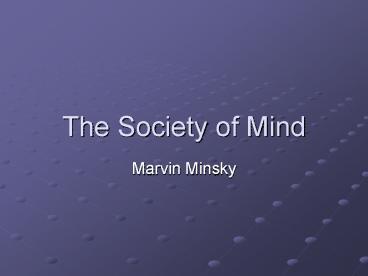The Society of Mind - PowerPoint PPT Presentation
1 / 11
Title:
The Society of Mind
Description:
The Mind and the Brain. The evolution of science has greatly ... Individual parts of a body contain no life; individual parts of a brain contain no mind. ... – PowerPoint PPT presentation
Number of Views:50
Avg rating:3.0/5.0
Title: The Society of Mind
1
The Society of Mind
- Marvin Minsky
2
The Agents of the Mind
- Theories of the mind must span at least three
different scales of time slow, fast and in
between. - A singular theory must also answer many questions
about the workings of the mind, much as function,
origins, heredity, and character.
3
The Mind and the Brain
- The evolution of science has greatly focused
questions of the mind. - Science has moved from explaining the basic
tenets of life to using machines to emulate
intelligence.
- The mind can integrate many small actions into
one simple, large action. - This is very similar to the box exercise in the
beginning of the class.
4
Blocks
- Making towers from blocks
- Choose a place to start the tower.
- Add a new block to the tower.
- Decide whether it is high enough.
- Adding a block
- First ADD must FIND a new block.
- Then the hand must GET that block and PUT it on
the tower top. - Commands must be broken into their smallest
elements.
5
Common Sense
- All knowledge starts from smaller, simpler parts.
- These parts become so integral to life that they
become extremely obscure and difficult to
describe.
6
Agents
- Agents are simple processes that turn other
agents on and off. - They accomplish all that their subagents
accomplish.
7
Bureaucracy
- Simple agents must be placed into a bureaucracy
to create a useful product. - An agent Builder would then point to a begin,
add, and end, each of which have their own
sub-agents arranged in a bureaucracy.
8
- Novelists
- Creates new hypotheses.
- Are more responsible for new innovations and
radical concepts.
- Reductionists
- Build on old ideas.
- Reductionists use these ideas to expand their
science further. - Their ideas are more conservative and more likely
to be correct.
9
Parts and Wholes
- Certain wholes are more than the sum of their
parts. - The phrase is often used when things combines in
unexplainable ways.
- For life and mind, only the whole has any
value. - Individual parts of a body contain no life
individual parts of a brain contain no mind.
10
Easy Things are Hard
- In the 1960s, MIT built a simple robot hand that
communicated with a camera to build with
childrens blocks. - It took years to create Move, See, Grasp, etc.
functions.
- It becomes extremely difficult to correctly
coordinate separate parts of a machine. - In general, were least aware of what our minds
do best.
11
Are People Machines?
- Human activities can be broken down into small,
simple actions. - It may be that humans are only highly complicated
machines with billions of parts.













![[PDF] READ Free Inside the Neolithic Mind: Consciousness, Cosmos and t PowerPoint PPT Presentation](https://s3.amazonaws.com/images.powershow.com/10123068.th0.jpg?_=20240906113)



![READ[PDF] The Parasitic Mind: How Infectious Ideas Are Killing Common PowerPoint PPT Presentation](https://s3.amazonaws.com/images.powershow.com/10082122.th0.jpg?_=202407191010)


![[PDF] The Absorbent Mind: A Classic in Education and Child Development for Educators and Parents Paperback – October 15, 1995 Ipad PowerPoint PPT Presentation](https://s3.amazonaws.com/images.powershow.com/10104577.th0.jpg?_=20240822113)










